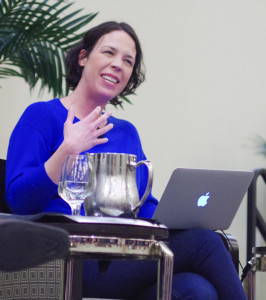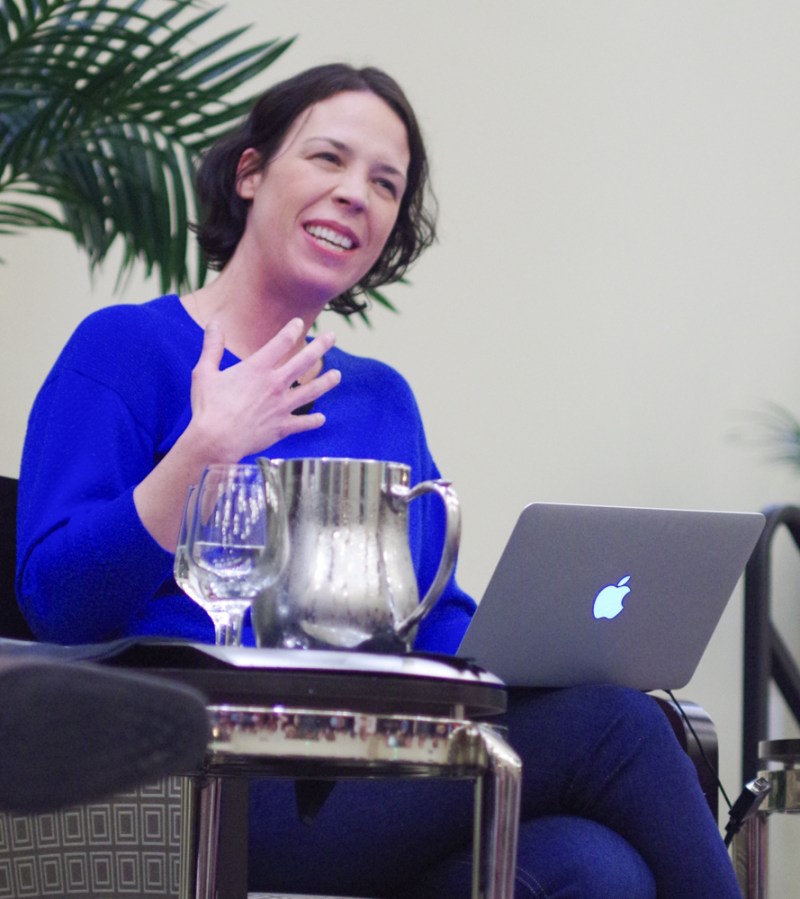
On a stage in front of 300 people, Julie Snyder, the senior producer of “This American Life,” shared the story of her career path and journalistic mantras with her audience and mediator Jonah Willihnganz, the director of Stanford Storytelling Project (SSP), the organization that put together the event.
According to Event Coordinator Liz Quinlan, SSP had been expecting around 100 students, setting up just half of the room of Paul Brest Hall. By the start of the actual event, however, organizers had to open up the rest of the room to accommodate the nearly 300 people who attended.
Snyder began by introducing the success of her show “This American Life”—which she said attracts 1.7 million listeners and has the most downloaded podcasts week after week—before talking about her career path.
Snyder’s humble beginnings in media began on her college campus as a student at UC-Santa Cruz, where she took a class on radio journalism. Her specific interest and strength in radio stem from her ability to tell a story intuitively.
“I had the understanding of a plot and tension and an idea and a reflection at the end,” she said.
When she first applied for the job at “This American Life,” the show had only been on the air for a year.
“I was incredibly unqualified and it was so small and new at the time that the bar was really low,” she said of her prospects.
She has been with the show for the past 17 years, thereby witnessing a shift in coverage away from individual, emotional stories to narratives that capture national events that major news outlets cover. The start of this shift for the show, she believes, was September 11th.
“Now [it’s about] trying to get the characters in the story-telling the events,” Snyder said of her approach.
Following 9/11, Ira Glass, then host of the show, pushed for coverage, so Snyder and the team sought out individuals to sit with and tell extended stories, people that “sounded like people and didn’t sound like sound bites.”
In her coverage of Katrina, Snyder followed a similar approach.
“Radio really lends itself to empathy probably because it is such a small and intimate medium,” Snyder said.
Snyder told a story of one interviewee in New Orleans who had described a near-fatal mistake of running back to her house to get cigarettes when the hurricane struck and the levees broke. For Snyder, this story allowed the readers to get a sense of the event’s impact on individuals.
Though Snyder spoke spontaneously and critically of reports she found lacking, including her coverage of most political stories and especially climate change, she paused when asked which episodes she most liked.
“My favorite episodes are usually the same ones as everyone else—ones that they really liked,” Snyder said.
In the last half hour, the event opened to questions from the audience, one of which challenged Snyder’s choice of words when packaging a story with an implicit bias, to which Snyder replied that journalistic choice of choosing a topic was in itself sending a message.
Snyder said that these stories and narratives were meant to help her understand the world the best she could.
“Obviously everyone is going to have his or her own thoughts, but it’s simply a process of being able to distill and package a story-to-be,” Snyder said. “I’m choosing a story that I’m going to tell you.”
Contact Alex Zivkovic at aleksa ‘at’ stanford ‘dot’ edu.
